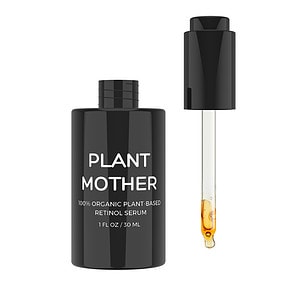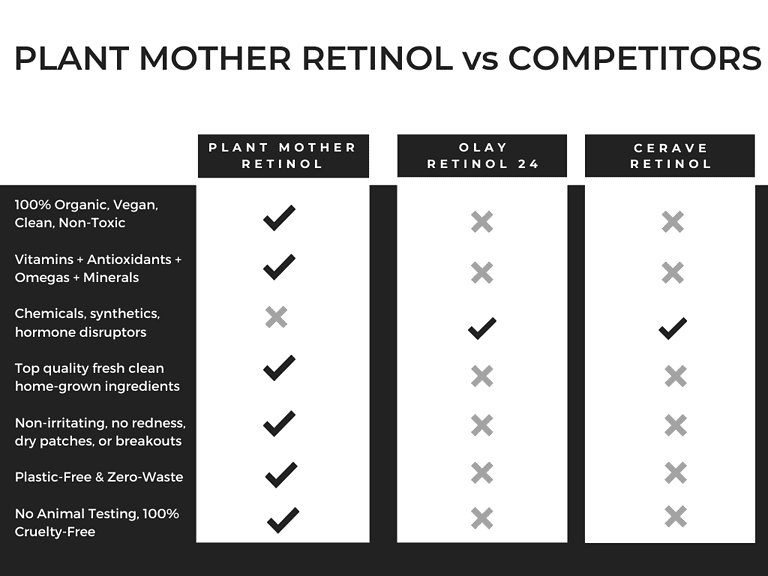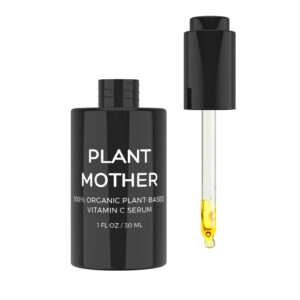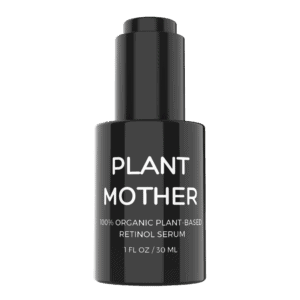Tretinoin vs Retinol: Everything You Need to Know, and More!

A Deep Dive Into Tretinoin And Retinol – the Good, The Bad, and The Beautiful
If you have been looking for wrinkle reducing products, Tretinoin and Retinol may have come up during your search. Everyone’s skin is different, and with that comes many questions: What exactly is the difference between Tretinoin vs Retinol? And which product is best for me?
Don’t stress! We’re here to break it down for you and tell you everything you need to know about Tretinoin vs Retinol. In this article, you’ll learn the following:
- Tretinoin vs Retinol – What Exactly Are They?
- Is Tretinoin a Retinol?
- Is Retinol Better then Tretinoin?
- Are There Any Similarities Between Them?
- Are All Retinols the Same?
- What To Look for In a Retinol?
- Should I Be Using Tretinoin?
- Should I Be Using Retinol?
- Tretinoin vs Retinol – Can I Use Both?
- Tretinoin vs Retinol Key Takeaways
1. Tretinoin vs Retinol For Wrinkles – What Exactly Are They?
Tretinoin and Retinol are similar ingredients, yet Tretinoin is stronger than retinol, requiring a prescription for use. It is a prescribed substance while retinol is available either as prescribed or over-the-counter. Tretinoin always comes as synthetic, lab-produced form of vitamin A, while Retinol can come as either synthetic or natural, vegan vitamin A. With that, tretinoin shows results faster than retinol but can be very harsh to the skin.
One of the biggest differences between Tretinoin vs Retinol is what happens when they are applied topically. Retinol does not directly affect the skin. Instead, Retinol is converted into retinoic acid through enzymes within the skin. Once converted into retinoic acid, it is effective. The process of converting retinol to retinoic acid can take some time and does not happen instantly.
On the other hand, Tretinoin is already retinoic acid, therefore you don’t have to wait for the skin to convert it. Because of this, Tretinoin is able to yield faster results than retinol. These fast results come with a price though – there are many unpleasant side effects of Tretinoin that we’ll talk about further below.
With Tretinoin, one may see improvements on their skin within 4 to 6 weeks, while it may take up to 12 weeks to see results with retinol. Because of the different strength levels, retinol is a great option for people with sensitive, dry, or even normal skin. Tretinoin is a good option for those who have extremely tolerant skin or have been using Tretinoin for at least a year or longer and have already acquired skin resilience.
2. Is Tretinoin a Retinol?
In short, no, however both Tretinoin and Retinol belong to the larger category of retinoids. Retinoids are a class of compounds derived from vitamin A. They come in many different strengths and consistencies. Today, there are six different lab-produced retinoids available: retinol, tretinoin, adapalene, tazarotene, alitretinoin, and bexarotene. They are available in a cream, gel, or liquid and are often found in serums, creams, and moisturizers. Additionally, there are a ton of brands to choose from, making it hard to know what is right for you and your skin type. Retinoid vs retinol is another distinction you need to be aware of.
Tretinoin: Tretinoin is a synthetic form of Vitamin A. It is also the most widely used prescription retinoid. Tretinoin is also known as retinoic acid, and this is the active ingredient that promotes healthy skin growth, ultimately smoothing out the skin to make it look fuller and more glowing. It is also used to treat acne, hyperpigmentation, and dark spots. The most popular prescription for Tretinoin is Retin-A. It is really important to know the difference between tretinoin vs retinol.
Adapalene: Adapalene is typically used for clearing acne by clearing clogged pores beneath the surface of the skin. It can be used to also treat blackheads, whiteheads, and blemishes. Additionally, it can help improve skin texture and appearance. Make sure you understand the difference between adapalene vs tretinoin.
Tazarotene: Tazarotene is generally used to reduce fine lines, wrinkles, and dark spots caused by overexposure to the sun. It can also reduce pore size and can help treat acne. Additionality it can be used to treat psoriasis by reducing inflammation on the skin.
Alitretinoin: Alitretinoin is another retinoid, and it is typically used to treat eczema. This is typically not prescribed to those looking for a wrinkle reducing solution.

3. Is Retinol Better then Tretinoin?
It depends on your skin. However, most skin types are too sensitive for the strength and harshness of Tretinoin. Why deal with redness, dryness, and irritation that come with Tretinoin use? Same goes for most prescription-based Retinols. They tend to be too strong and, more often than not, cause skin redness, extreme dryness, or skin purging. Therefore, to avoid products that are too harsh to your skin, make sure to pick a gentler yet effective retinols.
Plant Mother has a gentle and effective vegan Retinol Serum that allows even the most dry and sensitive skin to use retinol without any skin irritation or redness. It is perfect for those with sensitive, dry, or normal skin as it is made from non-irritating and soothing botanical ingredients. It is nutrient-dense and packed with over 20 anti-aging botanicals.
This Retinol contains high amounts of vitamin A to penetrate deep into the skin’s barrier and reduce fine lines and wrinkles while also keeping your skin glowing and well nourished. It promotes gradual cell regeneration and stimulates collagen production. You’ll start to see immediate results such as bright, glowy, and soft skin. However, deeper anti aging results will take 12-15 weeks to start showing. All that without any harsh side effects that you get when using Tretinoin or synthetic Retinols.
4. Tretinoin vs Retinol – Are There Any Similarities?
Tretinoin and Retinol are both retinoids. In general, all retinoids are used to speed up skin cell renewal and promote healthy skin cell growth. Additionally, they increase the production of collagen in your skin.
Collagen gives your skin elasticity, ultimately keeping it healthy, resilient, and plump. With these cell renewal and collagen boosting properties comes many wonderful benefits such as the reduction and prevention of fine lines and wrinkles, acne prevention, and evening out hyperpigmentation.
So, there are similarities but also lots of differences between Tretinoin and Retinol. The question of Tretinoin vs Retinol becomes an important question of matching the right product to your skin type. Read more and we’ll explain which skin type matches which retinoid.

5. Are All Retinols Same?
In short, no, every retinol formula is different. So, our initial comparison of Tretinoin vs Retinol implies another important distinction – synthetic vs natural retinol. The main difference is that some retinols are made of synthetic ingredients and others are made of natural non-chemical ingredients. The first, synthetic, is typically derived from animals. The latter is plant-based and vegan. And it’s not made of animal components.
Synthetic retinol can be good if you are struggling with severe acne, or if you are looking to quickly reduce the look of fine lines and wrinkles. So, prescription retinol is not necessarily better, but it is stronger. This can be a good or a bad thing, because for many skin types, it can be too harsh. There are different strength levels, and the most common are 1%, 0.5%, .0.3% and 0.25%. If you skin is sensitive, it is best to start with a lower strength level and work your way up to a higher strength level. However, even the lowest strength can dry out your skin and make it sensitive to sun damage.
While retinol is beneficial to most skin types, if your skin is dry or easily irritated, synthetic retinol may cause further irritation, redness, or dryness. If this is the case, stop using retinol and look for a gentler formula that’s right for you. Bakuchiol vs retinol is a good distinction to have in mind. Natural plant-based form of vitamin A from Bakuchiol works gradually over time and will help reduce fine lines and wrinkles, just at a slower pace.
To summarize, everyone’s skin is different, and their retinoid choice should reflect that!

6. What To Look for In a Retinol?
We talked about the Tretinoin vs Retinol, but what about the best retinol options? Once you’ve decided which retinol is right for you – prescription or over-the-counter, there are still more things to consider when choosing the best retinol.
While some companies keep you guessing on what really is in the bottle, others are open and transparent about what ingredients go into their product. It is important to look for a product that has all its ingredients listed. If opting for a natural, non-synthetic Vitamin A, focus on the one that does not contain any chemicals, synthetic preservatives, parabens, GMOs, phthalates, or artificial scents or colors. Those are healthier and less aggressive products than the typical synthetic retinol.
For those of you who love healthy vegan retinols that are based on natural Vitamin A – look for the following plants that are extremely rich with natural Vitamin A: sea buckthorn berry and seed, bakuchiol, rosehips, hibiscus, maracuja oil, acai, among others.
Plant Mother’s Retinol Serum contains all these Vitamin A rich botanicals and more. This Retinol is full of antioxidants, carotenoids, vitamins A, C, E. It contains a full spectrum of essential fatty acids (omega 3, 6, 7, 9). These are all necessary not only for anti-aging, but also for skin’s optimal health and nutrition.
7. Should I Be Using Tretinoin?
There is no simple answer to this question. A prescription from a dermatologist is needed to use Tretinoin, and you should only use it after talking with your dermatologist and obtaining a proper prescription. It is a medicine and is used to treat acne, and can improve the look of fine lines and wrinkles. Most people start to notice an improvement of their skin in about 2 to 3 weeks.
With that being said, your skin can easily become irritated when starting tretinoin, and sometimes your skin will take time to recover and adopt to Tretinoin. If irritation does not improve, it is best to stop application and talk with your dermatologist and look for gentler options. Therefore, if you are looking for faster results and have extremely tolerant skin, tretinoin may be a good option for you.
However, be aware of multiple side effects that include drying, flaking, or peeling skin. Then there’s annoying tretinoin purge. You may also experience a stinging or warming sensation when applying Tretinoin. Also, skin treated with Tretinoin is more prone to sunburn and sun damage. If you find these side effects unpleasant, look for milder but still very effective retinol options.
8. Should I Be Using Retinol?
The short answer for most skin types – yes! But not any sort of retinol. You should always look for a healthy, nutritious, and gentle yet effective formula. Don’t forget that retinol is like 401K, it accumulates over time and you reap the benefits of it later on. If you think long-term, then there’s no need to use harsh fast-working Tretinoin or synthetic retinol (unless you’re fighting a bad acne outbreak).
Both Tretinoin and synthetic Retinols come with serious side effects that can be avoided by using a healthy vegan Retinol such as Plant Mother’s Retinol Serum.
You can get numerous benefits to the skin with this healthier vegan retinol. Plant Mother Retinol Serum can help keep your skin looking youthful and reduce the look of fine lines and wrinkles without side effects. Additionally, it’ll nourish your skin with over 20 nutrient-rich botanicals and omegas.
9. Tretinoin vs Retinol - Can I use both?
There is no need to use both retinol and tretinoin, as they essentially do the same thing on different timelines and with different side effects. So, the main thing in Tretinoin vs Retinol question is what your skin needs short and long term.
If your skin is dry, sensitive, easily irritated by chemicals, or normal with a few dry patches – always look for a gentler, plant-based retinol alternatives. Remember, with retinoids, you’re investing in your skin’s health and appearance in a long run.
10. Tretinoin vs Retinol Key Takeaways:
- Both Tretinoin and Retinol belong to the larger category of Retinoids. Retinoids are a class of compounds derived from vitamin A.
- When it comes to Tretinoin vs Retinol, it is best to use retinol if you have dry, sensitive, or even normal skin.
- Vegan, organic Retinol provides not only an optimal level of natural Vitamin A, but also collagen, nourishment, and sun damage protection. Vitamin A is used to speed up skin cell renewal and promote healthy skin cell growth and increase the production of collagen in your skin.
- Plant Mother’s Retinol Serum has wonderful benefits such as the reduction of fine lines and wrinkles, extreme skin nourishment, and skin cell regeneration. All that without side effects of chemical Retinols or Tretinoin.
REFERENCES
MEDICAL DISCLAIMER
This content is for informational and educational purposes only. It is not intended to provide medical advice or to take the place of such advice or treatment from a personal physician. All readers of this content are advised to consult their doctors or qualified health professionals regarding specific health questions. The publisher of this content does not take responsibility for possible health consequences of any person or persons reading or following the information in this educational content. All viewers of this content, especially those taking prescription or over-the-counter medications, should consult their physicians before beginning any nutrition, supplement, skincare product, or lifestyle program.



